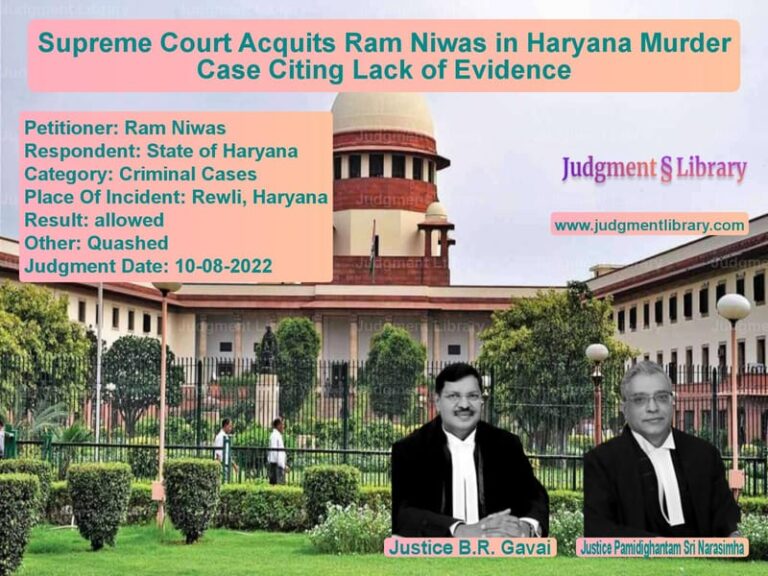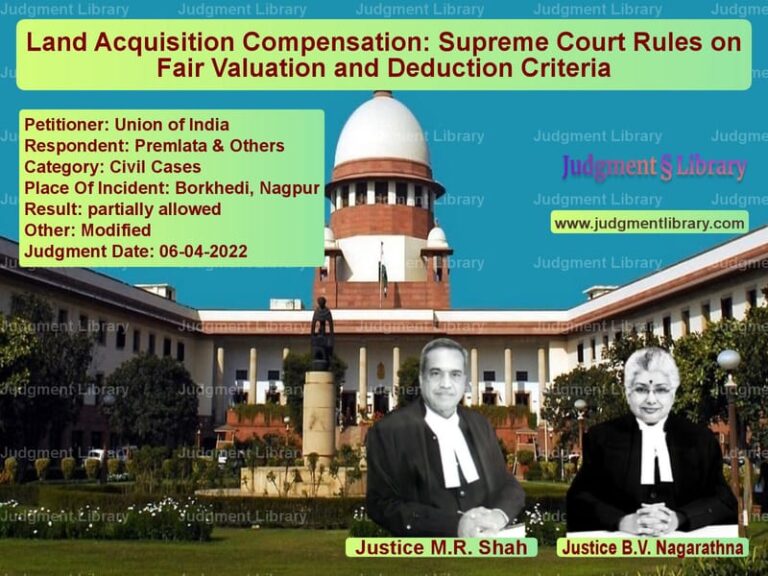Minority Shareholder Rights and Valuation Disputes: Vinod Krishan Khanna vs. Amritsar Swadeshi Woollen Mills
The case of Vinod Krishan Khanna & Others vs. Amritsar Swadeshi Woollen Mills Pvt. Ltd. is a landmark judgment concerning the rights of minority shareholders, valuation of shares, and company buy-back obligations. The Supreme Court was tasked with determining whether the National Company Law Appellate Tribunal (NCLAT) erred in modifying an order related to the valuation of shares and the interest payable to minority shareholders.
Background of the Case
The appellants were minority shareholders in Amritsar Swadeshi Woollen Mills Pvt. Ltd., holding 14.62% of the company’s paid-up share capital. They had filed a petition before the Company Law Board (CLB) under Sections 397 and 398 of the Companies Act, 1956, alleging oppression and mismanagement. During the proceedings, the parties reached an agreement, whereby the appellants agreed to sell their shares and exit the company. As a result, a valuer was appointed to determine the fair price of the shares as of March 14, 2007.
The valuation report, submitted on July 20, 2012, determined the share price at INR 10.35 per share. The National Company Law Tribunal (NCLT) accepted this valuation and issued an order on June 8, 2018, directing the company and its directors to buy back the shares at the determined price, with simple interest of 9% per annum from April 1, 2007, until the payment date.
Amritsar Swadeshi Woollen Mills challenged this order before the NCLAT, contesting the 9% interest rate. The NCLAT not only reduced the interest rate to 6% but also ruled suo moto that the company itself could not buy back its shares, and that only the directors (Respondents 2-9) would be liable to purchase the shares.
Aggrieved by this modification, the minority shareholders appealed to the Supreme Court.
Key Legal Issues
- Whether the NCLAT was justified in reducing the interest rate from 9% to 6% without any appeal from the affected parties.
- Whether the NCLAT had the authority to rule suo moto that the company could not buy back its shares.
- Whether the valuation date and methodology were correctly determined.
- The obligations of majority shareholders in purchasing minority-held shares.
Arguments by the Minority Shareholders (Appellants)
- The appellants contended that they had agreed to exit the company based on a fair valuation process and that the NCLT’s order should not have been modified.
- They argued that the reduction of interest from 9% to 6% was unjust, particularly since Respondents 2-9 (the majority shareholders) had not filed an appeal against the NCLT’s order.
- The appellants pointed out that the majority shareholders had continued to use company funds during the period in question, justifying the 9% interest rate.
- They challenged the NCLAT’s suo moto ruling that the company could not buy back its shares, arguing that this was outside the scope of the appeal.
Arguments by Amritsar Swadeshi Woollen Mills (Respondents)
- The respondents contended that the interest rate of 9% was excessive and that the NCLAT had rightly reduced it to 6%.
- They argued that the company should not be forced to buy back shares, as this would violate financial and regulatory constraints.
- They claimed that the valuation process did not account for potential changes in company performance post-2007.
- The respondents further contended that no legal basis existed for awarding interest, as no clear loss was suffered by the minority shareholders.
Supreme Court’s Analysis
The Supreme Court examined the issues in detail and made the following key observations:
- “The reduction of interest from 9% to 6% was erroneous, as Respondents 2-9 had not filed any appeal. A party that does not challenge an order cannot benefit from a reduced liability.”
- “The NCLAT exceeded its jurisdiction in ruling that the company could not buy back its shares, as this was never an issue raised in the appeal.”
- “The valuation date of March 14, 2007, was agreed upon by all parties, and any subsequent claims against it are without merit.”
- “Given that the appellants’ funds remained with the company and were utilized in its business, the award of 9% simple interest was fair and reasonable.”
The Court also cited the judgment in Dr. Renuka Datla vs. Solvay Pharmaceuticals B.V., emphasizing that interest is justifiable when a party’s funds are used by another entity for business purposes.
Final Judgment
The Supreme Court ruled in favor of the appellants and set aside the modifications made by the NCLAT. The final order was as follows:
- The minority shareholders’ shares would be purchased at INR 10.35 per share as determined by the valuation report.
- Interest of 9% per annum (simple interest) would be paid on the purchase price from April 1, 2007, until the final settlement date.
- The company was directed to execute the payment within four months.
- The suo moto ruling of the NCLAT regarding the company’s buy-back restrictions was set aside.
Implications of the Judgment
This ruling has significant implications for minority shareholders and corporate governance:
- It reaffirms that appellate courts should not suo moto alter orders without a challenge from affected parties.
- It establishes that minority shareholders who agree to a buyout must receive fair compensation, including interest for delays.
- It clarifies that valuation methodologies, once agreed upon, cannot be challenged arbitrarily.
- It upholds the principle that interest can be awarded when a company benefits from retained shareholder funds.
Conclusion
The Supreme Court’s decision in Vinod Krishan Khanna vs. Amritsar Swadeshi Woollen Mills ensures fairness in shareholder buyouts and protects the rights of minority investors. The ruling serves as a precedent for similar cases, reinforcing judicial oversight in corporate governance matters.
Petitioner Name: Vinod Krishan Khanna & Others.Respondent Name: Amritsar Swadeshi Woollen Mills Pvt. Ltd..Judgment By: Justice R.F. Nariman, Justice B.R. Gavai.Place Of Incident: Amritsar, Punjab.Judgment Date: 23-02-2021.
Don’t miss out on the full details! Download the complete judgment in PDF format below and gain valuable insights instantly!
Download Judgment: vinod-krishan-khanna-vs-amritsar-swadeshi-wo-supreme-court-of-india-judgment-dated-23-02-2021.pdf
Directly Download Judgment: Directly download this Judgment
See all petitions in Company Law
See all petitions in Shareholder Disputes
See all petitions in Bankruptcy and Insolvency
See all petitions in Corporate Governance
See all petitions in unfair trade practices
See all petitions in Judgment by Rohinton Fali Nariman
See all petitions in Judgment by B R Gavai
See all petitions in allowed
See all petitions in Modified
See all petitions in supreme court of India judgments February 2021
See all petitions in 2021 judgments
See all posts in Corporate and Commercial Cases Category
See all allowed petitions in Corporate and Commercial Cases Category
See all Dismissed petitions in Corporate and Commercial Cases Category
See all partially allowed petitions in Corporate and Commercial Cases Category







